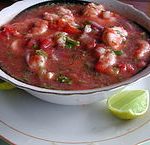
By Rinaldo Wurglitsch – originally posted to Flickr as Ceviche, Ecuador, CC BY 2.0, https://commons.wikimedia.org/w/index.php?curid=9688817
Ceviche is a seafood dish that is popular in the coastal regions of Latin American and the Caribbean. It is usually prepared from raw fish that has been cured in lemon or lime juices and spiced with chili peppers. A lot of times other spices and flavorings are added like cilantro and salt. ceviche is not cooked with heat and therefore must always be prepared and consumed fresh to avoid food poisoning.
Around 2000 years ago, a coastal civilization known as Moche used fermented fruit juice to marinate fish. Another source reports that prior to European colonization, fish was consumed with salt and aji and only after they arrived did the use of citrus begin. There are numerous explanations for the origin of ceviche but most historians agree that it originated from the colonial times of Peru.
I chose ceviche because it is a typical dish in Ecuador and the coastal regions and it represents the common use of coastal ingredients like fish in recipes. I had heard of ceviche before but I have never tried it. I didn’t know exactly what it was until I started researching it. Given that I’ve never tried it before I have nothing to compare ceviche in the Galapagos to, but I assume that it would be more authentic that ceviche here in Georgia.
I wonder who traditionally makes ceviche? Does anyone, or is it made by everyone? Is it a typically expensive dish or is it more like street food?
Because ceviche is made with raw fish, there are health risks involved with consumption. The FDA warns against consumption of ceviche during pregnancy and there are specific diseases that are specific to ceviche.
Because the Galapagos Islands are in fact islands, it makes sense that a common dish would be fish. Ceviche is very basic in how it’s made too with it being uncooked and simply marinated in fruit juice. Maybe throw in some salt or spices. It speaks a lot to the origins of the dish going back to Peru and the tools they may or may not have had to prepare food.

